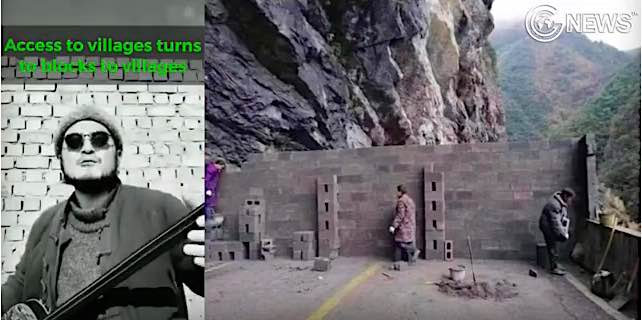
To follow blind bard Liu Hongquan’s song mourning Li Wenliang, thanks to Alex Davey and others on Twitter I note some great new satirical songs about Coronavirus by the enterprising Gansu folk-singer Zhang Gasong 张尕怂 (b.1989).
His own song about Li Wenliang appeared only very briefly on Weibo (see his regular posts there at weibo.com/zhangdabenshi). Another one, criticising a range of responses to the crisis, with incisive visuals, was also soon deleted from Chinese social media. Here’s a playlist:
And he created this song to cheer up his granny by satirising his unexpectedly lengthy sojourn upon returning home for New Year —a common predicament:
Musically the gutsy style, with funky sanxian lute, is reminiscent of the blind bards of Shaanbei—like Liu Hongquan’s song, the “northwest wind” makes an incisive medium.
On Zhang Gasong there’s a lengthy article in Chinese, with a clip from the documentary Huanghe gayao 黄河尕谣. What’s more, I find that he’s a fellow-stammerer (among posts under the stammering tag, note Great Chinese stammerers)! Here’s the trailer to Stammering ballad (Zhang Nan, 2018):
Brought up in a poor village of Baiyin municipality beset by frequent drought, he relished the huar song festivals at temple fairs; he managed to attend college, but found himself drawn back to his local culture, becoming a collector as he studied with noted folk performers.
Zhang Gasong studying Liangzhou xianxiao with Zang Shande (left) and blind female singer Feng Lanfang (right).
A busy touring schedule has brought him celebrity—though he finds the idea of “touring” (xunyan 巡演) poncey: “it’s pretty much like being an itinerant singer”. As his horizons have expanded, he’s absorbed new pop styles; yet he’s aware of the dangers of losing himself in the urban jungle, and as he astutely comments, he doesn’t like to be forced into representing a contrast between rural and urban China.
Here’s his song “Tell the truth”:
Appendix
Zhang Gasong’s work in collecting the local song cultures of Gansu, with its complex ethnic tapestry, is part of a long tradition dating back to the Maoist era. As ever, it’s worth consulting the folk-song and narrative-singing volumes of the Anthology:
- Zhongguo minjian gequ jicheng, Gansu juan 中国民间歌曲集成, 甘肃卷 (1994)
- Zhongguo quyi zhi, Gansu juan 中国曲艺志, 甘肃卷 (2008) (see here)
- Zhongguo quyi yinyue jicheng, Gansu juan 中国曲艺音乐集成, 甘肃卷 (1998)
- Zhongguo xiqu zhi, Gansu juan 中国戏曲志, 甘肃卷 (1995) (see here)
- Zhongguo xiqu yinyue jicheng, Gansu juan 中国戏曲音乐集成, 甘肃卷 (2006).

Feng Lanfang (centre).
Just one instance: Zhang Gasong visited Wang Yue 王月 (b. c1936; see also here), Zang Shande 臧善德 (b.1945), and female performer Feng Lanfang 冯兰芳 (b.1965) to study melodies from the Liangzhou xianxiao 凉州贤孝 (“virtuous and filial songs of Liangzhou”) genre, popular around the region of Wuwei. Belonging under the wide umbrella of morality songs “exhorting virtue“ quanshan 劝善, widespread in China, its history and structure are outlined in the Gansu narrative-singing volume. [1] Like so many genres around China (such as Zuoquan in Shanxi), it is mainly performed by itinerant blind singers for life-cycle and calendrical observances.
Research was carried out under Maoism, with official attempts to reform “superstitious” content of limited effect. Activity resumed more openly in the 1980s, coinciding with the Anthology fieldwork. In recent years Liangzhou xianxiao has been espoused by the Intangible Cultural Heritage project, with considerable media coverage—while (here I go again) substituting reified festivals on urban stages for serious ethnographic fieldwork on its life in a changing society.
Some of the great perfomers whom Zhang Gasong visited may be found in online videos; here’s Feng Lanfang, incorporating topical themes into her morality tales (cf. Bards of Shaanbei, under “Old and new stories”): [2]
For a roundup of posts on Gansu, click here. For some archive recordings of huar songs and narrative-singing from the northwest, note the CDs here; and for a recent project from Naxos, Folk music of China, vol. 1: folk songs of Qinghai and Gansu. See also my roundup of posts on narratvie-singing. Yet more instances of the remarkable resilience of Chinese tradition through successive modern crises…
[1] Zhongguo quyi yinyue jicheng, Gansu juan: introduction pp.636–40, transcriptions 641–92, biographies 693–4. More recently, see e.g. Li Wulian 李武莲 ed., Liangzhou xianxiao jingxuan 凉州贤孝精选 (2011).
[2] As I’m sure you’ll notice, the final instrumental melody (from 16.54) was mistakenly uploaded at high speed!



Pingback: Coronavirus: mourning Li Wenliang, and blind bards | Stephen Jones: a blog
Pingback: Bards of Shaanbei | Stephen Jones: a blog
Pingback: One belt, one road | Stephen Jones: a blog
Pingback: Some great Chinese stammerers | Stephen Jones: a blog
Pingback: Walking shrill: shawm bands in China | Stephen Jones: a blog
Learned something from you as always.
LikeLiked by 1 person
Pingback: Shadow puppets and Satie | Stephen Jones: a blog
Pingback: Coronavirus 3: temples, Sichuan | Stephen Jones: a blog
Pingback: Coronavirus 4: household Daoists in Shanxi | Stephen Jones: a blog
Pingback: Blind musicians in China and elsewhere | Stephen Jones: a blog
Pingback: Stephen Jones. Coronavirus: sfide all’autorità dalla Cina rurale – Sinosfere
Pingback: Coronavirus in China: four posts | Stephen Jones: a blog